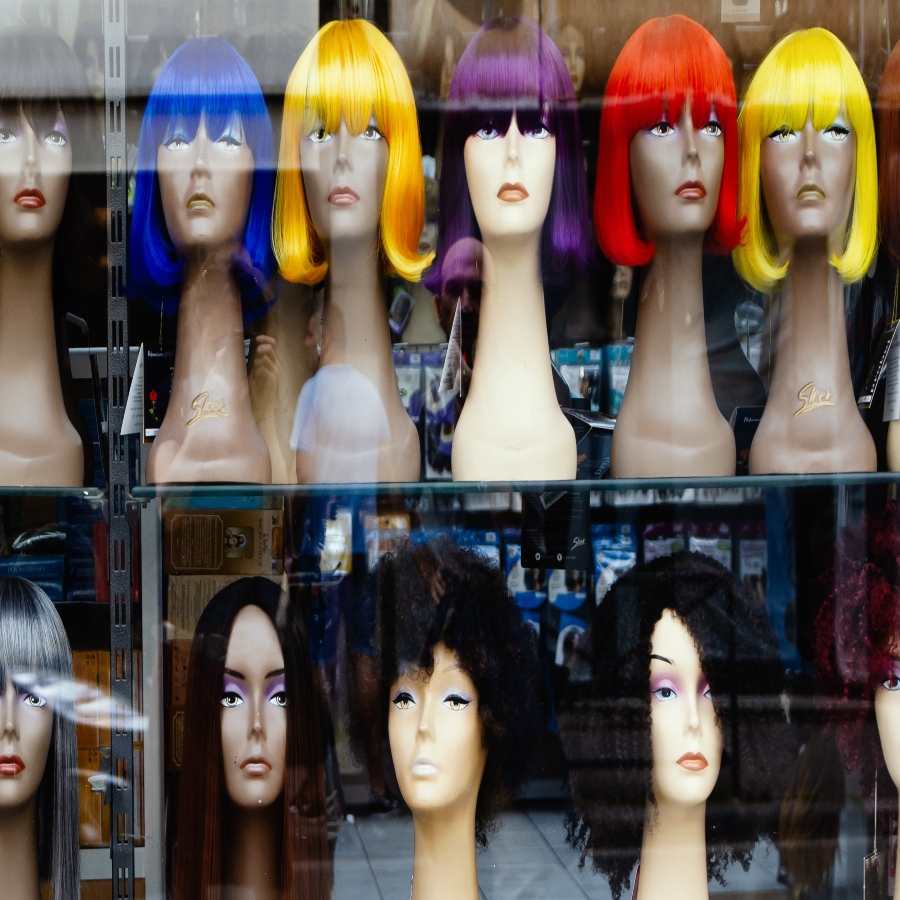One day Neela will run inside and steal me away.
The other wigs roll their eyes. They smell the hope on me—a sticky sweet decay like garbage abandoned in the sun. They believe in Second Girls, not fairy tales.
They did not hear the story I did: how one of us (miracle of miracles!) was returned to her rightful owner and her still warm scalp. My heart recycles the same fantasy like a mad carousel: reunion, coconut oil, the nape of Neela’s slender neck.
The glittering tingle of entry sings a new arrival, and I meet the new customer.
This girl is black, curves of breasts and hips where Neela was one straight line.
Her hair strangled tight into a ponytail under a baseball cap pulled low.
She darts towards the back wall, littered with barrettes and scrunchies.
The owner of the store yells at her back.
All purses to the front!
The girl surely saw the many signs, fat black marker on discarded cardboard.
I know just enough English to understand:
No Returns. No Loud Talking. No Big Bags.
No Children. No Exchanges. No Gum.
The owners of Beauty 123 may as well as next write: No You.
The girl makes her way to the register, a tornado.
Brown eyes flash, shoulders set in proud perches.
Only skin color connects Neela and this girl: darkest of brown like pregnant soil or the cave of a womb. Neela was gifted an inconspicuous nose, hazel eyes, and me dripping down her back in thick ropes of shine. Her skin; her main demerit. She dreamed of Fair & Lovely lotion raining from the sky. She dreamed of different parents and baths of bleach.
This girl holds her darkness with something close to pride.
She dumps her bag onto the counter, and the owner stuffs it underneath alongside leftover receipts, rolls of pennies, inventory slips gone bad.
Her jaw juts upward, and the diamond stud beneath her lower lip shines like an angel wing,
I am not a thief, she says.
They christened me Malia in an Italian warehouse.
Dyed me a milky purple and sewed me to gauze.
In this store, we are all renamed with tropical breeziness.
Leeana. Cristina. Kaylani and Jade.
Sweet names that kiss the edge of tongues.
These names betray us, here we are: dying under the dead glare of fluorescent light and Cellophane.
No one cares for the names we left behind.
I am the chosen one with heat-pliable waves lifted high onto a peeling Styrofoam head. Center stage. No customer fails to notice my beauty.
They gaze at me with longing, run their hands over my curves when the owner glances away. They pant like children after a lolly. I sense their desire the minute they enter. Then they learn of my price, sulk away as if duped.
No money, no honey, I would say if I had a mouth they could hear.
People think we are free for their taking.
I am even on television now, a black and white recording of the shop’s every move.
Neela would be proud.
She wanted to be an actress, practiced flipping me so I fell in one shy curtain over one eye, but her father laughed.
They are no better than prostitutes, he said, and besides, look in the mirror.
What kind of actress does not shine?
Beauty 123 has four monitors watching the store. As if one day the aisles of hair dyes, shampoos, and paddle brushes will descend from their shelves and flee.
The owner’s eyes track the girl’s every movement with the searing eyes of a hunter.
Even the owner’s hair, a short black bob streaked with grey, is alert.
Like a bodyguard wishing for near-death and glory.
I wonder why this girl, now pondering a wall of relaxers, has not looked at me, not even once. Is she selectively blind? Deliberately stupid?
How can she not desire to know my new name?
Days ago, one tiny girl tried to slip a butterfly barrette into her panties.
Her mother protested the charge, but the owner rewound the tape.
Finally, the girl pushed the yellow plastic forward onto the counter.
The owner used an envelope to skate the butterfly into a trash can, took out her camera as the
girl stood silent. The mother quieted.
The shame, thick as cooking oil.
Outside the door, the mother yanked the barrette girl along.
The owner retold the story to her own daughter, pantomined the barrette girl’s hiding place, the mother’s dramatic arguing.
Her own daughter, a timid thing with bitten-down fingernails, was busily stocking nail polishes on the front counter.
Tiny prizes like keychains and toy-sized lotions arranged to flirt with impulse buyer whims.
The daughter sighed.
C’mon, mom. A barrette? she said before turning back to her task.
The owner jabbed at her daughter’s shoulder.
The surprise of the stab made a polish fall to the floor and shatter in a blue blob of glass.
I understand little of their language, but every lace knows a mother’s disappointment, weighty like a rain-soaked roof.
We all had a First Girl who had a mother.
The owner pointed to the floor, brushed by her daughter so that the girl flinched.
Do you know the sorrow of hair that wishes to cry and cannot?
A sob of fury shoved into each lock?
Some women, like the owner, are just born that way.
The daughter knelt, rubbed at the polish already congealing like a crater.
There is still a stain there, an aftermath of blue.
Barrette girl’s photograph has joined the other shoplifters on a blank space of wall near the entrance. The picture is blurry. She is looking down, the baubles in her hair heavy like anchors.
I try not to feel sorry for her. Fail, try again.
She would learn the lesson elsewhere, probably more harshly.
A girl should never desire more than what she has.

